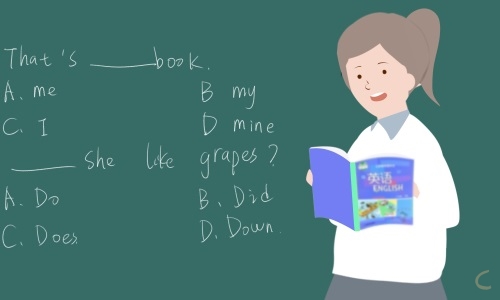初二上册英语语法知识点总结
初二上册英语语法知识点总结(大全)
同学们,我们如果想取得好的学习成绩,必须要有良好的学习习惯。习惯是经过重复练习而巩固下来的稳重持久的条件反射和自然需要。建立良好的学习习惯,就会使自己学习感到有序而轻松。下面小编为大家带来初二上册英语语法知识点总结,希望对您有所帮助!

初二上册英语语法知识点总结
He said I was hard-working.
重点语法:宾语从句
结构:主语 + 谓语动词 + 宾语从句(主语 + 谓语动词 + 宾语/表语)
例句:----Im good at English. He says. (改为加宾语从句的复合句)
----He says Im good at English.
注意:①主句是一般现在时态,宾语从句的时态不受其影响。
例句:He says Im good at English now.
He says I was good at mathematics when I was young.
②主句是过去时态,宾语从句也要用过去时态。
例句:He said I was good at mathematics when I was young yesterday.
He said I was good at English now yesterday.
③宾语从句是客观真理时永远用一般现在时态。
例句:Our teacher says 24 hours make a day.
Our teacher said the sun gives us so many energy yesterday.
④动词原形不能作主语,必须用其 -ing 形式。
例句:She said helping others changed her life.
重点短语:direct speech 直接引语
reported speech = indirect speech 间接引语
first of all = at first 首先
pass on 传递
be supposed to do sth. 应该做某事
be good at = do well in 在某方面做得好
in good health 身体健康
get over 克服
open up 打开
care for = take care of = look after 照料;照顾
not any more = not any longer = no longer 不再
have a cold 感冒
end-of-year exam 年终考试
get nervous 变得紧张
forget to do sth. 忘记做某事(该事未做)
forget doing sth. 忘记做某事(该事已做)
its + adj. + [for sb.] + to do sth. 做某事[对某人来说](加形容词)
context 上下文
Reading Strategy(阅读方法)
First read for meaning, not for detail. (首先理解文段的大致意思,不在于文段的细节部分。)
You can understand the meaning of a word you dont know from the context. (至于不懂的单词,你可以通过上下文来寻找它的正确释义。)
If you go to the party,youll have a great time!
初二英语语法重点难点知识
重点语法:if 引导的条件状语从句
结构:主句 + if + 条件状语从句
if + 条件状语从句 + [(comma)] + 主句
注意:在 if 引导的条件状语从句中,主句应用将来时态,状语从句用一般现在时态。
例句:Youll have a great time if you go to the party.
=If you go to the party, youll have a great time.
重点短语:take away 拿走
around the world = all over the world 在世界各地
make a living 谋生
all the time = always 一直
Whats the problem? = Whats the matter? = Whats wrong? 怎么了?
in order to do sth. 为了做某事
make sb. do sth. 使得某人做某事(to 省略,该结构是一个不带 to
的不定式。)
make sb. adj. 使得某人(加形容词)
make sb. done 使得某人被做
be famous for 为而出名
be famous as 作为而出名
in class 在课堂上
spend (time/money) on sth. = spend (time/money) in doing sth. 花(时间/钱)用于做某事
see sb. do sth. 看见某人做某事(强调整个过程)
see sb. doing sth. 看见某人做某事(强调偶然性)
say said said 动词 say 的原形、过去式和过去分词
tell told told 动词 tell 的原形、过去式和过去分词
eat ate eaten 动词 eat 的原形、过去式和过去分词
speak spoke spoken 动词 speak 的原形、过去式和过去分词
八年级英语语法知识点归纳总结
【重点短语】
1. fewer people 更少的人(fewer修饰名词复数,表示否定)
2. less free time 更少的空闲时间(less修饰不可数名词,表示否定)
3. in ten years 10年后(in的时间短语用于将来时,提问用How soon)
4. fall in love with„ 爱上„
例:When I met Mr. Xu for the first time, I fell in love with him at once
当我第一次见到许老师,我立刻爱上他
5. live alone 单独居住
6. feel lonely 感到孤独(比较:live alone/go along等)
The girl walked alone along the street, but she didn’t feel lonely那女孩独自沿着街道走,但她并不感到孤独
7. keep/feed a pet pig 养一头宠物猪
8. fly to the moon 飞上月球
9. hundreds of +复数 数百/几百(概数,类似还有thousands of; millions of)
10. the same as 和„„相同
11. A be different from B A与B不同(=There is a difference/Thgere are differences between A and B)
12. wake up 醒来(wake sb. up表示 “唤醒某人”
13. get bored 变得厌倦(get/become是连系动词,后跟形容词如tired/angry/excited等)
14. go skating 去滑冰(类似还有go hiking/fishing /skating/bike riding等)
15. lots of/a lot of 许多(修饰可数名词、不可数名词都可以)
16. at the weekends 在周末
17. study at home on computers 在家通过电脑学习
18. agree with sb. 同意某人(的意见)
19. I don’t agree. = I disagree. 我不同意
20. on a piece of paper 在一张纸上(注意paper/information/news/work/homework/housework等常考到的不可数名词)
21. on vacation 度假
22. help sb with sth/help sb do sth 帮助某人做某事
23. many different kinds of goldfish 许多不同种金鱼
24. live in an apartment 住在公寓里/live on the twelfth floor 住在12楼
25. live at NO.332,Shanghai Street 住在上海路332号
26. as a reporter 作为一名记者
27. look smart 显得精神/看起来聪明
28. Are you kidding? 你在骗我吗
29. in the future 在将来/在未来
30. no more=not „anymore 不再(强调多次发生的动作不再发生)I’ll go there no more.
31. no longer=not„ any longer 不再(强调状态不再发生)
32. besides(除„之外还,包括)与except „but(除„之外,不包括)
33. be able to与can 能、会
34.be big and crowded 大而且拥挤
34. be in college 在上大学
35. live on a space station 住在空间站
36. dress casually 穿得很随意casual clothing 休闲服饰
37. win the next World Cup 赢得世界杯 win award 获僵
38. come true 变成现实
39. take hundreds of years 花几百年的时间
40. be fun to watch 看起来有趣
41. over and over again 一次又一次
42. be in different shapes 形状不同
43. twenty years from now 今后20年
英语语法归类
词类:名词、代词、不定代词、冠词、形容词、副词、介词、数词、连词、限定词
动词:动词、助动词、情态动词、动词时态、被动语态、不定式、动名词、现在分词、过去分词、虚拟语气
句子成分:句子成分、主语、谓语、主谓一致、定语、状语、宾语、表语、同位语
句子类型:疑问句、there be 句型、祈使句、感叹句、be、of、noun
从句:从句、状语从句、定语从句、名词性从句、宾语从句、主语从句、表语从句、同位语从句
其它:强调句型、倒装句、省略句、独立主格
英语语法最基础的一条规律
无论句子多么复杂,其本质就是一棵树的树干,只不过树干可能有个主干和侧枝罢了。
怎么说清楚这句话呢,其实我们仔细研究汉语和英语的差别会发现他们的主干和侧枝各不相同。
中文重意合,英文重形合。意思是,中文句子之间的联系大都靠语义,而英文的句子 sentence 则是通过一个个分句 clause 串联起来,每个 clause 都有自己的特殊标记,比如,定语从句的标记有 that, which 等,时间状语从句有 when, while,所以形式上非常明确,像树形结构。汉语,在说话之前肯定会讲到一个状语也就是一个大背景,因此才会有__渲染气氛,这在古诗词中尤为明显,强调的重点一定在后面。而英语呢,它强调的是直接说重点,而后面定状补都是在后面的一种补充。
学习英语语法理解长难句的核心也是要找出句子的树干,也就是拆分句子寻找主谓宾,然后再看从句才能真正读懂句子。
